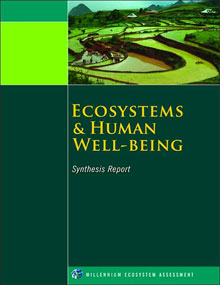Book Notes
 Ecosystems and Human Well-Being: Synthesis. A Report of the Millennium Ecosystem Assessment (Washington, DC: World Resources Institute, 2005), 160pp.
Ecosystems and Human Well-Being: Synthesis. A Report of the Millennium Ecosystem Assessment (Washington, DC: World Resources Institute, 2005), 160pp.
In June 2001 the Millennium Ecosystem Assessment was launched under the auspices of the United Nations at the request of Secretary-General Kofi Annan. The resulting effort has been a remarkable collaboration of over 1,300 blue ribbon scientists from 95 countries, a governing board of the broadest possible stakeholders—international organizations, financial institutions, health workers, governments, business leaders, NGOs, and indigenous peoples, and funding from broad and diverse quarters. The MA was tasked to "assess the consequences of ecosystem change for human well-being and to establish the scientific basis for actions needed to enhance the conservation and sustainable use of ecosystems and their contributions to human well-being." Scientific credibility, policy relevance, and well-being for all human beings guide the report. Their first product was Ecosystems and Human Well-Being: A Framework for Assessment (2003), which set out the conceptual and methodological foundations of the project.
The current Synthesis focuses on four core questions. How have ecosystems changed over the last 50 years? What have been the gains and losses? What are the prospects for the next 50 years? How might we reverse ecosystem degradation and enhance human well-being? In addition, the Synthesis reviews their findings on nine key questions, and then adds five appendices. Where needed, the report qualifies the "certainty" of their findings as "very certain, high, medium, low and very uncertain." Some losses, for example, are already irreversible. Nonlinear changes are more complicated to predict. Tradeoffs are quite common and shift responsibilities and costs to different stakeholders. Monetary-market values are important, but so are non-monetary-non-market ones. One finding is clear: a disproportionate share of ecosystem degradation is being borne by the very poor who are most impacted by it. The Synthesis does not admit to simple solutions, and reads as a very sober and sobering document, but in fact it identifies itself as guardedly optimistic in the sense that our wise choices in the future could make significant, positive differences.
The very first sentence of the Bible invests our world with an inherent value, in and of itself: God created the world, declared it very good, and then asked human beings to manage it as His stewards. That alone, it would seem, would cause Christians to care very deeply about issues of environment and ecosystems. In addition, there is a utilitarian argument to make. We are, as the Synthesis puts it, "fundamentally dependent upon" and "integral parts of" the ecosystem. Our fate is bound up with the fate of the planet. You might not know know about biomes, eutrophication, or mean trophic levels. I didn't. But you will still understand much of this important document. I hope it finds its way into the hearts and minds of many believers and their churches.


